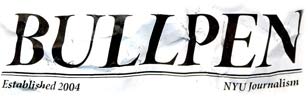Lecture: Peter Greenberg
RELATED:
"There are two kinds of bags: carry-on and lost," Peter Greenberg, travel journalist and editor for NBC's Today Show, said about checking his luggage with airlines. Instead, Greenberg ships his luggage before he leaves and finds his bags safely inside his hotel room when he gets to his destination. "It's not about cost. It's about value," he said. "I save two and a half hours of my life every time I fly."
With such a distrust of airline's capabilities, it's surprising that Greenberg chose travel journalism as a career. But Greenberg, author of three travel books, correspondent for the Travel Channel, host of a call-in radio show and journalist for Men's Health and The New Yorker, is one of the most experienced travel journalists in the business.
At a lunchtime lecture at New York University, Greenberg spoke to journalism students about his long career in travel journalism and the changing face of travel in the United States.
Greenberg began his speech by thanking NYU for rejecting him after graduating from high school. Instead, he attended the University of Wisconsin in the mid-1960s during the decade's infamous campus riots. With the National Guard stationed on his campus and large clouds of tear gas every night, Greenberg covered stories as a "stringer" for Newsweek. During the '60s, the magazine averaged nine covers a year on the campus riots, and Greenberg, a freshman in college, got the opportunity to cover them. After working as a stringer, Newsweek hired him at 20-years-old — the youngest reporter on the magazine.
"The definition of tourist is a victim waiting to happen. The definition of a traveler is a tourist who has been victimized."
"I spent my summers in Los Angeles covering nine states and Mexico," he said. "Not bad for my summer vacation."
When he graduated college, no one was covering travel as news, he explained. Travel was used as an advertising vehicle for airlines, hotels and cruise ships rather than as actual news that interested people.
Greenberg hoped to change this and started writing a column for the Chicago Tribune about "which cruise lines lined, which airlines lost your luggage" and other atrocities of the travel industry.
"The definition of tourist is a victim waiting to happen," he told the students. "The definition of a traveler is a tourist who has been victimized."
Greenberg stressed that travel journalism has transformed from writing about sandy beaches in Bermuda to writing about how to minimize the abuse a traveler endures when they go on vacation. His travel pieces arm travelers with the tools they need to make the process as painless as possible.
A large portion of contemporary travel journalism is spent on dealing with increased security procedures and confronting areas of travel that remain unsafe.
"Airline security is there to make people who don't travel feel better," he said. "It was the same before 9/11. Now there's just a bigger show."
Laughing at the current security measures, such as plastic utensils and confiscating pairs of tweezers, Greenberg emphasized that the government is missing the point. With so much attention focused on safeguarding airlines, the government is ignoring the vulnerability of American-branded hotels, like Hiltons and Sheratons, as terrorist targets.
"A hotel is nothing more than a World Trade Center where people spend the night," he explained.
At any given night, a Hilton in the middle of New York City may have more guests than the victims of the Sept. 11 attacks. But hotels are ignoring this threat because they don't want to "inconvenience their guests with extra security," Greenberg said. If the government doesn't acknowledge this threat, he anticipates that an American-branded hotel will be hit by a terrorist attack within the United States.
Beyond the increased security procedures, Greenberg emphasized that traveling doesn't have to be such an abusive experience. The best tip for travelers: talk to the maid.
"The maid knows everything!" Greenberg said. He encouraged students to talk to cab drivers, maids and other service workers in vacation spots. These people can show you the best places to visit and give the best advice about how not to be ripped off.

